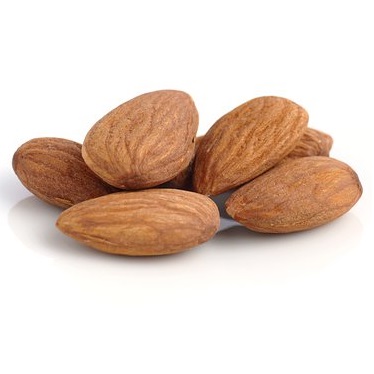| inglés > español | |
|
| almond | |
| 1. almendra | |
| inglés > inglés | |
|
| almond | |
| 1. s. A type of tree nut. |  |
| 2. s. A small deciduous tree in family Rosaceae, Prunus dulcis, that produces predominantly sweet almonds. |  |
| 3. s. Other plants that produce almond-like nuts: |  |
| 4. s. , bitter almond, a variety that only produces bitter fruits |  |
| 5. s. , flowering almond, an ornamental shrub in family Rosaceae |  |
| 6. s. , desert almond, a North American shrub in family Rosaceae |  |
| 7. s. , desert range almond or (vern, wild almond), North American shrub in family Rosaceae |  |
| 8. s. Terminalia catappa, Indian almond or tropical almond, in family Combretaceae |  |
| 9. s. , wild almond, novern=1 or bitter almond, in family Proteaceae |  |
| 10. s. The colour of the kernel of an almond without its shell and thin seed coat, a creamy off-white colour. |  |
| (color panel, almond, FFEBCD) |  |
| 11. s. The color of an almond still covered by its skin, a shade of brown. |  |
| (color panel, almond, A67B5B) |  |
| 12. s. Anything shaped like an almond; specifically, (anatomy, archaic) a tonsil. |  |
| 13. adj. Brownish, resembling the colour of an almond nut. |  |
| español > inglés | |
|
| almendra | |
| 1. n-f. almond (type of tree nut) |  |
| 2. n-f. kernel (central (usually edible) part of a nut) |  |
| 3. n-f. (colloquial Spain) a human head, especially a big one; a melon |  |
| Ahora que lo pienso, es verdad que tiene buena almendra. (Now that I think about it, he does have a huge melon.) |  |


